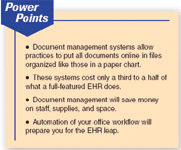Article
The easy way to a paperless office
A document management system can give you instant chart access and automate your office without changing the way you work.
Document management systems are getting good. While still widely regarded as way stations to an EHR, the best document management programs can automate an entire practice without requiring physicians to input data or overhaul the way they work.
"We looked at several EHRs that the doctors didn't want to use because they didn't want to become slaves to doing data entry in the exam room," says David Wortman, administrator of Victory Internal Medicine, a six-doctor practice in Staten Island, NY. Two years ago, he says, the practice purchased SRS Freedom Chart Manager, a document management system. "It's improved the doctors' workflow instead of slowing them down, which is what would have happened with an EHR system." The added efficiency, he says, has allowed the practice to increase revenue by 40 percent without adding more staff.

If you've been pondering whether to get an EHR, but are afraid of the cost and the loss of productivity, you should consider a good document management program. It could help you move into the electronic world now without limiting your options later on. And it would enable you to automate your office in nearly every way that an EHR would. Here's how some physicians have gone paperless-without an EHR.
Getting notes online is easier than it looks
FP Richard M. Hays, who practices with a partner in Lake Worth, FL, got SRS' Freedom Chart Manager three years ago because "our medical records work was becoming very burdensome. We had charts everywhere, and it was difficult to keep up. There were always documents that had trouble finding their way into a chart." Now he has instant access to his records anywhere he has an Internet connection.
Hays handwrites his notes on a tablet computer, using "digital ink," and they go straight into his document management system. While his staff electronically files most scanned and imported documents, they segregate lab results, and he sorts those reports himself while reviewing them. Since this only involves "dragging-and-dropping" them into the patient charts, it takes him little extra time, he says. And he can use SRS' internal messaging system to tell his staffers what to do next with the results.
Both Quest Diagnostics and LabCorp automatically download new labs to the document management system (they do this in PDF format). This service costs the practice nothing. But the doctors did have to pay a modest sum for the interface with their practice management system.





